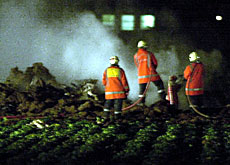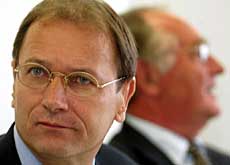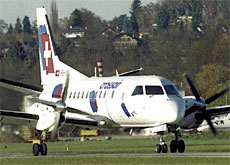Pilot errors were likely cause of Crossair crash

Air accident investigators have confirmed that pilot errors were the likely cause of a Crossair plane crash near Zurich in January 2000.
A preliminary report into the crash backed up earlier media reports that the Moldovan captain of the aircraft may have been under the influence of medication.
Switzerland’s aircraft accident investigation bureau said traces of the tranquilliser Phenocepan were found in the body of the pilot, who died in the crash along with his two fellow crew members and all seven of the plane’s passengers.
However, the investigating team stressed that it could not prove a direct link between the medication and the crash, which occurred shortly after the plane left Zurich airport en route for the German city of Dresden.
“This type of drug can impair the faculties leading to general sleepiness or slow reactions,” investigating doctor Peter Iten told swissinfo.
“We can’t say for sure whether the pilot was impaired in this case, but clearly substances such as Phenocepan do not belong in the cockpit.”
No technical problems
The bureau said there was no evidence to suggest that the crash was caused by technical problems.
The report added that the crew might have been disorientated because of differences between the Crossair plane – a Saab 340 – and eastern European models, with which the pilots were more familiar.
Both the Moldovan captain and his Slovakian co-pilot were on short-term contracts with Crossair, which had been suffering from a shortage of staff at the time of the accident.
According to the bureau the crew could also have been confused by the layout of the cockpit’s instruments and warning systems. It added that the captain’s decision to turn off the aircraft’s automatic pilot might also have contributed to the crash.
The report also pointed out that the pilots might have had difficulty understanding each other. It said the Moldovan captain’s ability to speak English – the lingua franca of international aviation – was too limited to hold more than a basic conversation.
New airline
Last April, Crossair went on to form the backbone of new national airline, Swiss, whose CEO André Dosé insisted on Friday that the new airline had already learned the lessons of the Crossair crash.
“The report came as no surprise to us, because we have been working with the investigators for a long time now,” Dosé told swissinfo.
“Our own findings, along with the investigators’ recommendations, have all been fully implemented and we have also defined entirely new standards in line with the new company.”
Dosé said that Swiss had already changed its recruitment policy and would no longer be recruiting foreign pilots on short-term contracts. He added that training programmes and cockpit procedures had also been overhauled.
Both Dosé and Swiss chairman Pieter Bouw admitted that the past few months have been a difficult time for the fledgling airline.
The crash was the first in Crossair’s 25-year history. Last November, 24 people died when a Crossair jet crashed on its approach to Zurich airport during a flight from Berlin.
Pay dispute
As well as facing continuing technical problems, which in July forced the cancellation of 240 flights, the company is still involved in a bitter pay dispute with former Crossair pilots.
Cabin crew shortages and the recent forced landing of a plane at a German military airfield have also made for some unwelcome headlines. But Dosé insists he can turn things around.
Having put together a task force to investigate the company’s technical problems, Dosé on Friday announced the appointment of a new Chief Operating Officer in the shape of former KLM operational director Karel Ledeboer (see “Swiss tackles image problem”).
Although the pay row shows no immediate signs of being resolved, Dosé said he was confident that the cabin crew shortage would not persist for much longer.
“We talk a lot to our customers,” Dosé told swissinfo, “and most of them are telling us that they think we’ve done a good job when you look back to how things were [following the collapse of Swissair] a year ago.”
“We have already achieved around 30 per cent of our final goals,” he added, “and I have no doubt that we will build one of the best and most reputable airlines.”
by Mark Ledsom
The pilot may have been under the influence of medication.
The crew may have been confused by the layout of the cockpit’s instruments.
The captain’s decision to turn off the aircraft’s automatic pilot might have contributed to the crash.
There was no evidence to suggest that the crash was caused by technical problems.
The crash was the first in Crossair’s 25-year history.

In compliance with the JTI standards
More: SWI swissinfo.ch certified by the Journalism Trust Initiative


You can find an overview of ongoing debates with our journalists here. Please join us!
If you want to start a conversation about a topic raised in this article or want to report factual errors, email us at english@swissinfo.ch.